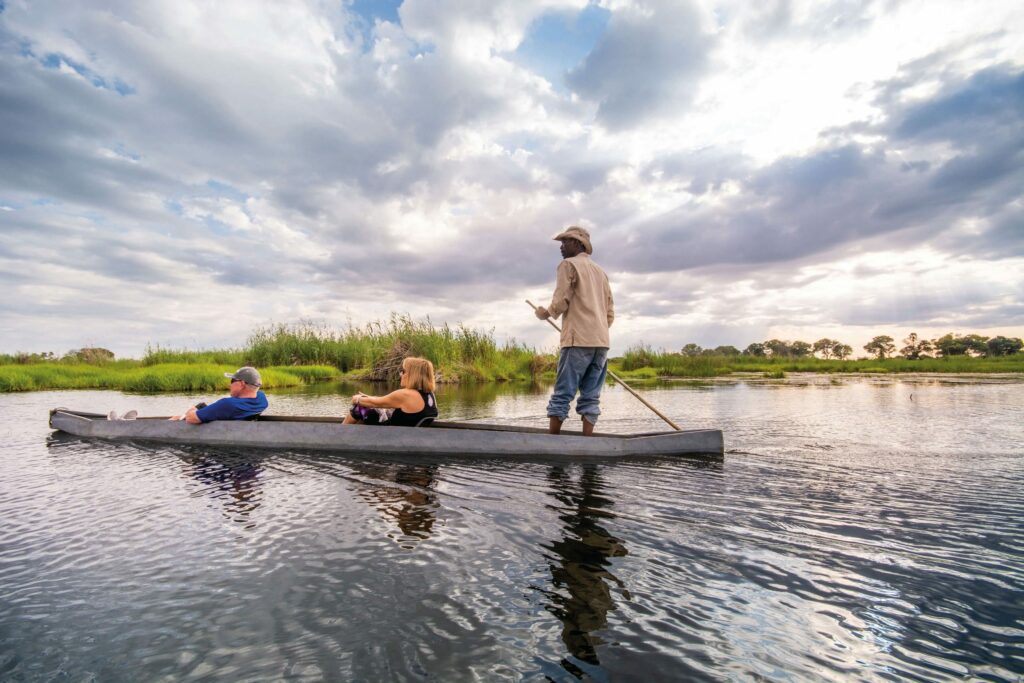DELTA ROYAL FLUSH
The Okavango Delta is a place well known to Batswana as a stunning natural wonder that has long been celebrated as one of the world’s top tourist destinations for wildlife. For decades, it has drawn adventurers, photographers, and nature lovers from around the globe, eager to witness the untamed beauty of one of the last true wildernesses. But for me, the Delta has always symbolised something more—an untapped well of potential for personal transformation.
Even public figures like Prince Harry have spoken about the deeply personal impact of time spent in the Delta. “This is where I feel more like myself than anywhere else in the world,” he said, reflecting on the healing power of the region. Prince Harry’s connection to Botswana, where he sought solace after the loss of his mother, echoes what many have felt: the Delta’s profound ability to offer emotional healing and personal clarity, sharing how his time in Botswana provided him with space for healing and self-reflection, particularly in times of personal hardship. “I came here in 1997, and I fell in love with this country. Botswana is a very special place to me,” he explained, highlighting how the Delta is more than just a destination—it’s a sanctuary for the soul.
The Delta has always been a symbol of our national pride, a place where visitors from abroad marvel at the majesty of our wildlife. It’s a jewel in the crown of our natural heritage. But beyond the usual safaris and tourism, there lies a much deeper, almost spiritual potential. In a world where stress and overstimulation have become the norm, the Delta’s tranquil beauty offers something rare: an opportunity to reflect, grow, and transform.
For years, I’ve been drawn to the idea of creating a retreat here, one that allows participants to immerse themselves not only in the sights and sounds of wildlife and nature but in the inner work of self-discovery and personal growth. The same elements that draw tourists—wildlife, peace, and expansive landscapes—are exactly what make the Okavango the ideal setting for transformation.
Scientific research supports what many of us intuitively know: nature has a profound ability to impact the mind, body, and soul. Studies have shown that spending time in natural environments, especially those as rich in biodiversity as the Okavango Delta, improves mental clarity, reduces stress, and fosters creativity. The awe one experiences while watching elephants bathe in the Delta’s waters, or hearing the call of a lion at night, isn’t just a fleeting emotional reaction—it’s an opening to something deeper.
Each time I have visited the Delta I’ve reflected on how this awe-inspiring environment could be harnessed for deeper, more personal journeys. The peace, the space, the untouched nature—what if this unique setting could be more than just a place to observe? What if it could serve as a catalyst for people to reconnect with themselves, explore their inner world, and embark on a transformative journey unlike any other?
In a 2015 study published in The Journal of Personality and Social Psychology, researchers found that awe-inspiring experiences in nature, such as witnessing wildlife in its natural habitat, lead to a “broadening of perspective.” This kind of shift is key to personal growth. When we step out of the familiar and into an environment that inspires awe and humility, we become more open to new ideas and possibilities. The Okavango, with its rich diversity of life, offers countless opportunities for these moments of awe.
So that’s what I have been working on—designing a retreat so far from the daily rush and noise of busy life, participants can experience a space of deep reflection. As Edward O. Wilson’s biophilia hypothesis suggests, humans have an innate connection to nature. We thrive when we are immersed in it. The Okavango’s vastness, its ever-shifting water channels, and its teeming wildlife provide an environment where participants can leave behind the distractions of daily life and reconnect with their inner selves. It’s almost as if it doesn’t need me as a facilitator—the Delta does it independently.
But I do have a role because the retreat isn’t just about being surrounded by beauty (as tempting as that might be just to let it all evolve organically). It is about using that beauty as a tool for transformation. So, with nature as a guide, and facilitators creating a safe space, we help participants navigate their thoughts, emotions, and life choices. The very act of observing the interconnectedness of wildlife and ecosystems becomes a mirror for our own interconnectedness with the world and the people around us.
My dream is that participants come with a desire for change—whether they’re grappling with life’s challenges, leadership issues, seeking clarity, or simply looking for time away from the pressures of modern life. By the end of the retreat, they leave with more than just memories of wildlife sightings. They depart with new perspectives, new insights, and a deeper connection to themselves. They also have a wildlife experience as good as you will find anywhere else in the world. It’s a win-win, really. The holiday of a lifetime and change to last a lifetime.

